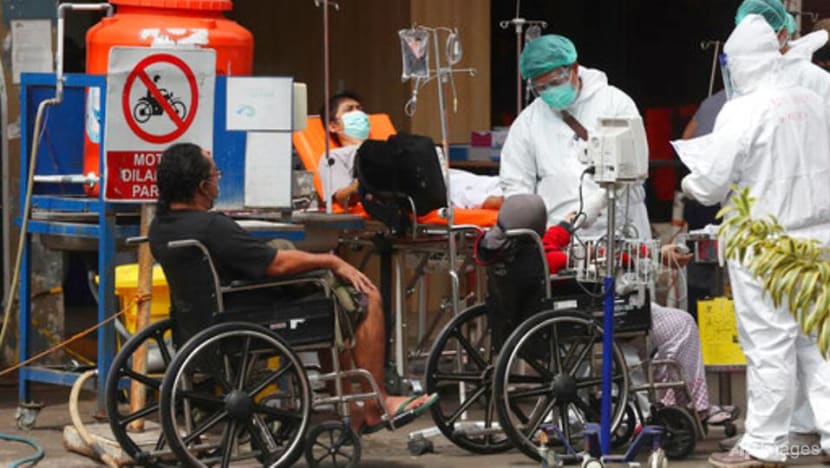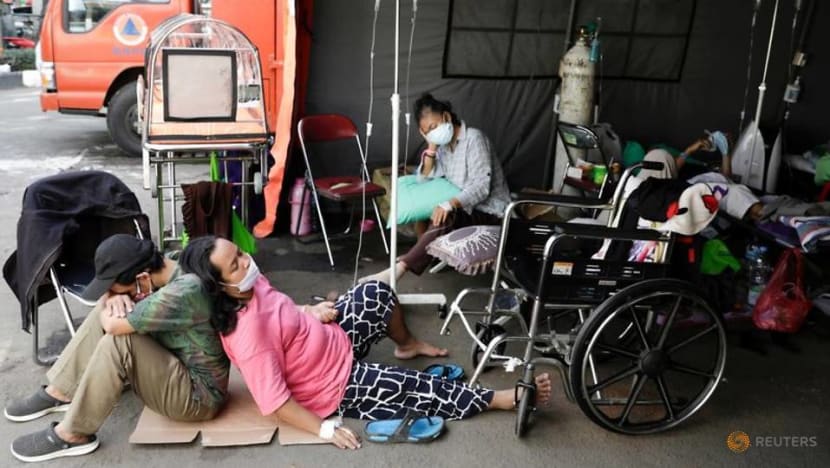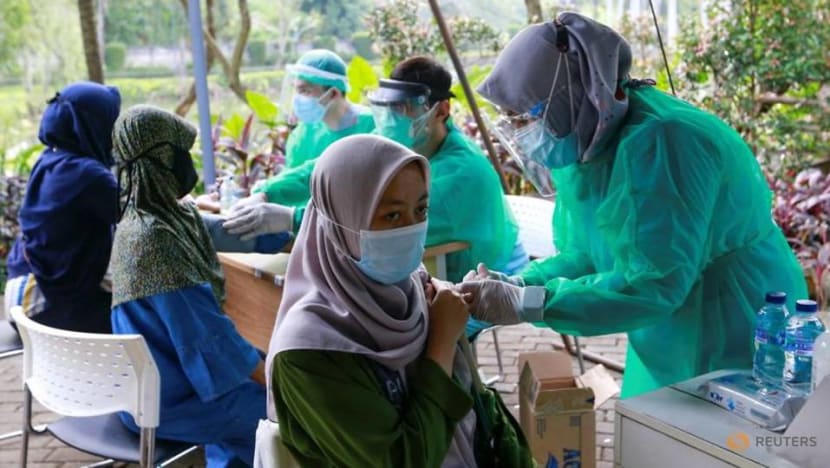Indonesia expects COVID-19 situation to improve next week with emergency curbs, more hospital beds: Minister

Paramedics tend to people at an emergency tent erected to accommodate a surge of COVID-19 patients at a hospital in Bekasi on the outskirts of Jakarta, Indonesia, Saturday, Jul 10, 2021. (Photo: AP/Achmad Ibrahim)
JAKARTA: Indonesian minister Luhut Pandjaitan said he expected the COVID-19 curve to flatten and the situation to improve by next week, as the country battles a surge in COVID-19 cases that has overwhelmed the nation’s healthcare system.
Over the last seven days, Indonesia has recorded more than 240,000 COVID-19 cases and nearly 6,000 deaths. The influx of cases has caused a shortage in hospital beds and oxygen tanks, leaving thousands of people unable to receive proper medical treatment.
Mr Pandjaitan, who is Coordinating Minister for Maritime and Investment, said the government has taken a number of steps to address hospital bed and oxygen shortages, as well as to boost vaccination drive and reduce people’s mobility via curbs known as PPKM Emergency.
“With vaccination, PPKM (Emergency) enforcement, improved supplies of medicines, oxygen and hospital beds, we will see conditions get better,” Mr Pandjaitan said at a press conference on Monday (Jul 12).
The minister's comments came a few hours before the health ministry reported a record high of 40,427 new cases over a 24-hour period, the biggest spike since the pandemic began. A total of 891 people died of COVID-19 that same day.
Mr Pandjaitan had been appointed by President Joko Widodo to oversee the implementation of PPKM Emergency, referring to the broad emergency community restrictions for the islands of Java and Bali from Jul 3 to Jul 20.
READ: What might have caused the huge spike in Indonesia's COVID-19 cases post-Idul Fitri holiday
READ: Fear, stress, relief – How CNA's Nivell Rayda tested positive for COVID-19 as cases spike across Indonesia
“We will try to keep the number of cases below 30,000 (per day). We hope that next week, if all of us remain disciplined, cases will flatten and the situation will improve,” he said.
The minister highlighted the fact that between Jul 9 and 11, the number of daily cases has been declining.
The previous record of 38,391 COVID-19 cases was reported last Thursday. A total of 38,124 cases were reported the following day, before the daily infections fell to 35,094 on Jul 10 and 36,197 on Jul 11.
Mr Pandjaitan said the government is trying to convert several public hospitals into facilities dedicated to COVID-19 patients, adding that the military has also agreed to deploy its doctors and open emergency field hospitals.
“This way, demand (for hospital beds) will be met and there shall be no more people struggling to find hospital beds,” he said.

Beginning Wednesday, the government will also be distributing 300,000 packets of medicines and supplements for asymptomatic patients and those with mild symptoms and do not require hospitalisation, Mr Pandjaitan said.
The government is trying to procure 50,000 oxygen concentrators for patients who have difficulty breathing and struggle to find hospital beds with ventilators. These concentrators are able to convert normal air into pure oxygen, he said.
Indonesia currently only has 10,000 of these devices, the minister added.
“We will be lending the concentrators to people at home. One concentrator is enough to supply oxygen for up to five days. Once COVID-19 is over, we can distribute (these concentrators) to hospitals,” he said.
Indonesia has also been trying to import oxygen cylinders and liquid oxygen from other countries. Singapore has sent two shipments of emergency oxygen supplies and equipment to Indonesia.
READ: Indonesians ignore warnings in rush to buy anti-parasite drug for COVID-19
Mr Pandjaitan said the government will also be ramping up its vaccination drive. Currently, Indonesia is able to inoculate around one million people a day. There are plans, the minister said, to increase this to two million jabs per day by next month.
“Starting this week, we will increase vaccination by having health workers directly going to marginalised communities,” he said.

INDONESIA NEEDS 3,000 DOCTORS AND 16,000 NURSES: MINISTER
Speaking at the same press conference, Health Minister Budi Gunadi Sadikin said the government is trying to address the shortage of healthcare workers as more and more hospital beds are added.
The government is trying to recruit 3,000 doctors and at least 16,000 nurses, Mr Sadikin said.
“We are making preparations by identifying nursing school students who have passed the competency tests but still at their final semesters. We will find ways to expedite these nurses’ education so they can quickly enter into practice,” he said, adding that the same applies to doctors.
The health minister also noted that there had been an increasing number of health workers who were infected with COVID-19, despite the fact that nearly all of them had been vaccinated with Sinovac.
“We are very concerned about this. The plan is to conduct a third vaccination for them using Moderna. It will start as soon as possible so we can protect these frontline workers,” he said.
Indonesia on Sunday received shipments of three million Moderna vaccines, some of them will be used as third booster jabs for 1.47 million health workers.
More than 2.4 million Indonesians have been infected with COVID-19 since the pandemic began, more than 64,000 of whom died.
BOOKMARK THIS: Our comprehensive coverage of the COVID-19 pandemic and its developments
Download our app or subscribe to our Telegram channel for the latest updates on the coronavirus outbreak: https://cna.asia/telegram












